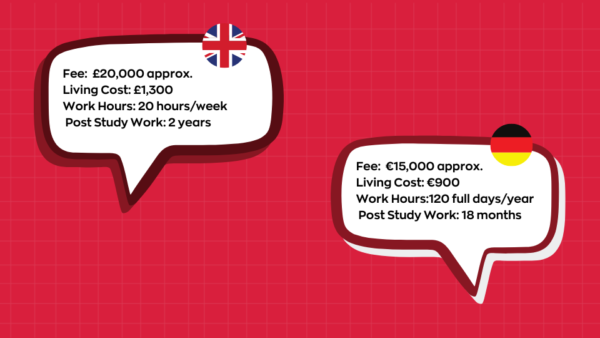In the recent past, there has been an increasing demand for Germany as a study destination. Meanwhile, the United Kingdom has always been a popular choice. For students from India, both countries offer excellent education systems, research infrastructures and post-study work opportunities. Take a look at the higher education system in the British Isles and Germany at a glance.

|
The United Kingdom |
Germany |
| Top Universities |
- Imperial College London
- University of Oxford
- University of Cambridge
|
- Technical University of Munich
- Ludwig-Maximilians-Universität München
- Universität Heidelberg
|
| Duration |
Bachelor’s: Typically 3 years (Scotland has 4 year programmes)
Master’s: 1 year |
Bachelor’s: 3 years (Some programmes might take 4 years). It’s based on a credit system.
Master’s: Typically 2 years (There are a few 1-year programmes.) |
| Choosing majors/ specialisations |
At the time of admission |
At the time of admission |
| Top Choice of Subjects |
- Medicine and Dentistry
- Veterinary Medicine
- Education
- Law
- Business Management
- Architecture
- Social Sciences
- Humanities
|
- All specialisations of Engineering, especially automobile
- Business Management
- Computer Science and IT
- Social Sciences
|
| Average Tuition fees |
- UG: £15,000 – £35,000 per year (varies by course and university). Medicine can go up to £50,000/year.
- PG: £10,000 – £38,000 per year. MBA programs are often more expensive, up to £60,000.
|
- UG: Free in public universities; €10,000 – €20,000 per year in private universities.
PG: Free in public universities; Private universities: €10,000 – €20,000 per year
|
| Cost of Living per month (approximate) |
|
- €850 – €1,200 (INR 85,340.00 – 1,20,480.00)
|
| Work while you study |
- Allowed up to 20 hours per week
|
- A maximum of 120 full days a year
|
| Post-Study Work |
Graduate Immigration Route – 18 months |
Extended residence permit – 18 month stay |
How to choose between these two countries?
Your choice primarily depends on your course and the university most suited for your choice of studies. Everything else is secondary. Is the university at the cutting edge of your field? Is the university curriculum matching your needs? Where does the university stand in terms of global recognition? These are the questions you must ask first while choosing. Then comes all the other factors such as:
- The teaching-learning style of the department you are applying to
- The costs involved
- The admissions criteria that you need to meet
- Immigration policies and job opportunities and
- Attitudes towards international students in the university/ city/ country.
Keeping this in mind, here are the pros and cons of studying in the UK vs Germany. Let us dive right in.

1. Cost of Studying
For most Indian students, this is an important factor when choosing countries. As some of the most developed nations in the world, it is natural to wonder how high an investment you will have to make. Here are some average figures to aid your financial planning.
UK: The average tuition for undergraduate study is around 20,000 GBP (INR 23,31,548.00). For Postgraduate study, you can expect to spend around 21,000 GBP (INR 24,48,125.40). These figures are bound to vary depending on your courses or the university.
Germany: One of the most important reasons why Germany is an international student favourite is because, since 2014, tuition fees have been abolished in public universities. You will still have to pay an administrative fee ranging from €100 – €350 (INR 10,041.60 – 35,145.60) per semester but higher education is extremely affordable in Germany. While this is primarily applicable for undergraduate courses, most public universities also charge very minimal tuition for master’s programmes as well. However, there are some exceptions. Executive programmes and post-professional programmes typically have a tuition fee. MBAs, for instance, have average tuition fees ranging from €20,000 – €40,000 (INR 20,08,320.00 – 40,16,640.00).
Winner: If you are considering only the cost of studying, Germany is the clear winner. You will invest a lot less in the Deutschland when compared to the UK.
2. Language Barriers
UK: It is a statement of the obvious that English is the official language of the United Kingdom. As a student from India who has attended English medium schools, proving your proficiency in English need not necessarily be an arduous task.
Germany: Only in the last decade or so, German universities have begun offering a handful of programmes completely in English, designed specifically for international students. This is also primarily applicable at the postgraduate level. Otherwise, courses are taught in German. It means that you must invest a significant amount of time to ensure you can, not just communicate in basic German, but also understand technical jargon in the language. Most universities require you to show proof of proficiency in English and German (the level might vary depending on the medium of instruction).
You will also need to know the language to have a fuller life in the country. You can get by with minimal German in large cities such as Berlin, Munich, Frankfurt or Hamburg but will need to communicate in the language in smaller cities such as Stuttgart, Dresden or Aachen.
Winner: The UK, as there are no language barriers. However, knowledge of a foreign language can also be a major advantage in the global economic landscape.
3. Quality of Education
UK: The academic heritage and renown of the UK needs no separate validation. Two of the oldest and world-class universities are located here – The Universities of Oxford and Cambridge. Besides these two giants, most of the universities in the UK have a long standing history of providing well-rounded higher education to its students. In addition to being one of the best countries for higher education, the UK also has a significantly higher number of universities when compared to Germany. It means that your prospects of getting to the UK are better.
Here are the top 10 universities in the UK according to 2025 QS World University Rankings.
| S.No |
World Ranking |
University |
| 1 |
2 |
Imperial College London |
| 2 |
4 |
University of Oxford |
| 3 |
6 |
University of Cambridge |
| 4 |
9 |
UCL |
| 5 |
31 |
King’s College |
| 6 |
34 |
University of Edinburgh |
| 7 |
35 |
University of Manchester |
| 8 |
51 |
University of Bristol |
| 9 |
56 |
London School of Economics and Political Science (LSE) |
| 10 |
74 |
University of Warwick |
Germany: While not carrying the same legacies as England, German universities have built a reputation for themselves across the world. With the highest GDP in Europe, Germany is at the forefront of the technological and innovation race in the western world. The universities provide state of the art infrastructure and inspire their students to push the boundaries of knowledge and research.
Top 10 universities in Germany, according to QS World University Rankings
| S.No |
World Ranking |
University |
| 1 |
22 |
Technical University of Munich |
| 2 |
58 |
Ludwig-Maximilians-Universität München |
| 3 |
80 |
Universität Heidelberg |
| 4 |
88 |
Freie Universität Berlin |
| 5 |
98 |
KIT, Karlsruhe Institute of Technology |
| 6 |
105 |
RWTH Aachen University |
| 7 |
130 |
Humboldt-Universität zu Berlin |
| 8 |
145 |
Technische Universität Berlin (TU Berlin) |
| 9 |
193 |
Universität Hamburg |
| 10 |
201 |
Albert-Ludwigs-Universität Freiburg |
The German higher education system also gives you the choice between a Hochschule and a university. Hochschulen are institutions at the post-secondary level offering hands-on learning, where you split your time – 50% of it is spent on gaining practical experience. In contrast, the remaining is spent on theory. Universities offer a more academic, research-based and theoretical approach to subjects.
Winner:
The UK, because of its university rankings. However, both countries are popular study destinations for different courses. The competition to be enrolled in German universities is also tougher for two reasons: 1. Germany has fewer universities than the UK. 2. Since the practice of no tuition fee has been initiated in the public universities, the number of applicants have increased.
4. Duration of Study
UK: Undergraduate programmes are typically 3 years long. The one exception is Scotland where many programmes are designed for 4 years. A master’s degree in the UK is 1 year long.
Germany: Most undergraduate programmes in Germany are also 3 years long with a few exceptions. However, postgraduate courses are typically 2 years long.
Winner: A tie. It depends on your personal preference and how intensive or spaced out you would like your courses to be. With the UK you can begin working earlier. In Germany, you can spend more time on your research and spread out your courses.
5. Cost of Living
UK: According to the British Council, except for London, the average cost of living is about £1,400 (INR 1,63,181.48) per month. If you are living in London, you can add another £200-300 to your monthly expenses. Under the NHS basic healthcare is also free for international students.
Germany: Living costs in Germany are lower than that of the UK. The German government has stipulated that an international student aiming to get a German visa should maintain a minimum of 11,208 euros in a blocked account. That translates to about €934 a month. Most living cost estimates published by universities also range between €850 – €1,200 (INR 85,340.00 – 1,20,480.00). With health insurance, you will have access to one of the best healthcare systems in the world.
Winner: Germany
6. Student visa and work while you study
UK: You will need a UK student visa (previously known as Tier 4 visa). It costs about £524 (~ INR 61,065.18) to apply and is not often granted to part-time courses. The processing time is typically 8 weeks. Under this visa, you can work for a maximum of 20 hours per week when the semester is in progress and 40 hours during vacation. The national minimum wage is £12.21 (INR 1,422.91) per hour.
Germany: If you have received a letter of acceptance from a German university, then you must apply for a German Student Visa. If you are considering visiting the university or entering Germany to undertake an entrance exam, then it is the Student Applicant Visa. The visa fee is 75 EUR (~INR 7,527.08). On arrival, you must register with the Ausländerbehörde (Immigration Office) in the German city within two weeks to get your residence permit. The processing time is longer and can take up to 3 months.
Under this visa, you can work up to 120 full days or 240 half-days a year. 8 hours of work is considered a full day. For the sake of comparison, it comes up to approximately 18 hours a week. The minimum wage is €12.82 (INR 1,286.63)/ hour.
There is no winner in this category. The immigration procedures of your destination country must be followed.
7. Post-Study Work Visa
UK: On completion of your study, you can take the Graduate Immigration route and stay in the UK for up to two years and work or look for work. There is no limit on salary and therefore offers flexibility. You are eligible to apply on completion of both bachelor’s or master’s degree programmes. On completion of the two years, you can upgrade to a Tier 2 Skilled Visa under the sponsorship of the organisation that you work for.
Germany: On graduation, you can apply for a Residence Permit that lasts 18 months. This period is given to you to look for employment. If you are a highly skilled worker, have a postgraduate degree or professional training and earn over €56,400/year, you can apply for an EU Blue card. It is a short pathway from there to permanent residency in any of the European Union nations.
8. Career Opportunities
Both Germany and Britain are two bustling nations with two of the top GDPs in Europe. At the international level, they are important players, especially in the field of technology, finance, development and innovation. That said, the job market is extremely competitive in both nations.
The UK is slightly less stable because of Brexit. However, opportunities in the two countries also depend upon the field you are in. Some jobs are easier than other, depending on skills, as there are is a severe skill shortage in both countries in different domains. Engineers, for example, are in high demand in the UK while Germany is in need of social and healthcare professionals.
When it comes to average salaries, as absolute figures, the UK’s is slightly higher, at about 12%. But, considering the cost of living, Germany has the better income-cost ratio. Ultimately, your career is dependent on your qualification, your skills, your experience and at what level you can pitch yourself.
One significant advantage that Germany offers is that, once you have the EU PR, you can also find work in Austria, Italy, Denmark, Switzerland, the Netherlands, France, Belgium or any of the other EU nations.
9. Culture
UK: The United Kingdom is made of four different countries – England, Scotland, Wales and Northern Ireland. This makes its culture extremely diverse. Be it history, sports, music or the UK pub culture, life in the UK as an international student can be full of rich experiences.
Germany: Be it classical music, sausages, sports or beer, Germany is also a nation rich in culture. The expanse of the country also allows you to explore all kinds of things – from urban life to idyllic suburbs and wilderness.
Winner: Germany. There are absolutely no judgments being passed on a nation’s culture here. Germany is the winner here because of its work culture. Germans are known for maintaining work life balance and generally frown upon overtimes. This might not be the case with many organisations in the UK.
10. Weather
While both these nations are located in similar climatic zones, German weather is more manageable entirely because it is more predictable and moderate when compared to the UK. It is a common thing in Great Britain to expect unexpected rains at any point in time.
Winner: A Tie
Both countries have their own set of pros and cons and it is impossible and impractical to choose, based on general advantages and disadvantages. These are to help you mentally prepare for what to expect when you go to the country of your choosing. However, if you run through the parameters with a specific course and university in mind, you will be able to judge which of the two is better suited for you.
















![Best Universities in New Zealand for International Students [2025 Rankings]](https://tcglobal.com/wp-content/uploads/2025/09/Best-Universities-in-New-Zealand-for-International-Students-2025-Rankings-600x338.png)